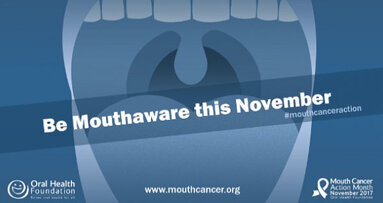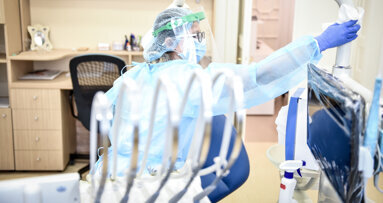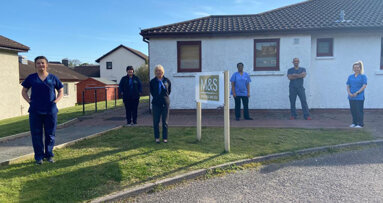STIRLING, Scotland: The Scottish government has clarified that it will not introduce the recommended 24-month recall intervals for “low-risk” dental patients after an outcry from dental professionals in the country.
The recommendations were put forward as part of the government’s Oral Health Improvement Plan (OHIP), which cited the National Institute for Health and Care Excellence’s guidelines that patients who are not considered to be “at risk of or from oral disease” have their recall interval extended to up to 24 months.
However, a recent survey conducted by the British Dental Association (BDA) found that 97 per cent of responding Scottish dentists were concerned that extending recall intervals to this length of time could undermine the detection of oral cancers. There has been a 37 per cent increase in oral cancer deaths in Scotland over the past decade and the survival rate for oral cancer can improve by 50 to 90 per cent with early detection.
The BDA’s Scottish Council warmly received the government’s decision, which it had feared was driven by a desire to reduce costs. “We welcome assurances that 24-month dental recall intervals will not be introduced—and that 'high-risk' patients will be seen more frequently than those in good oral health,” said Dr Robert Donald, Chair of the BDA’s Scottish Council.
“The Scottish Government has acknowledged publicly that we are right to raise our concerns on this issue. The profession will have a further period of discussion with government to explore these concerns and hopefully come to a sensible solution that does not put our patients’ lives at risk.”
“This will come as welcome news for patients and practitioners. Our members were clear that telling 'low-risk' patients to come back in 24 months would only undermine efforts to meet a growing threat, while putting needless pressure on NHS cancer services. We believe that patients should ideally be seen every six months, and that 'high-risk' patients should be seen more frequently.”
Tags:
RUGBY, UK: In summer, people around the world poured a bucket of ice-cold water over their heads as part of a campaign initiated by the ALS (amyotrophic ...
LONDON, UK: General awareness of mouth cancer in the UK remains dangerously low, despite more than 7,500 people being diagnosed with mouth cancer annually. ...
BELFAST, UK: The SARS-CoV-2 virus has not only brought with it the fear of infection, but has also caused great pain to dental patients who have had limited...
LONDON, UK: The Oral Health Foundation has called on dental and health professionals to raise awareness of mouth, or oral, cancer and communicate the ...
FORT WILLIAM, UK: Owing to strict government restrictions for controlling the spread of SARS-CoV-2, dental practices in Scotland were instructed to limit ...
LONDON, UK: It has been established that patients with a phobia of dentistry may often delay visiting the dentist or avoid it altogether. It comes as ...
Vancouver orthodontist Dr Sam Daher is one of the world’s leading experts in clear aligner treatment. Having performed more than 4,000 treatments with...
LONDON, UK: After its recent landslide victory in the UK general election held on 4 July, the new Labour government has placed dentistry high on its list of...
DUBLIN, Ireland: Though the last two years have been rife with cancellations and postponements of dental congresses, a return to in-person events is slowly ...
GLASGOW, Scotland: The Faculty of Dental Surgery of the Royal College of Physicians and Surgeons of Glasgow has published its response to the Scottish ...
Live webinar
Thu. 5 February 2026
7:30 pm UTC (London)
Dr. Boota Ubhi BDS, FDS RCS (Edin), MDentSci, MRD RCS (Eng) Specialist, Cat Edney
Live webinar
Fri. 6 February 2026
1:00 am UTC (London)
Dr. Zeeshan Sheikh Dip.Dh, BDS MSc, M.Perio, PhD, FRCDC, Dip-ABP
Live webinar
Wed. 11 February 2026
12:00 am UTC (London)
Prof. Dr. Wael Att, Dr. Robert A. Levine DDS, FCPP, FISPPS, AOD, Dr. Larissa Bemquerer ITI Scholar at Harvard
Live webinar
Wed. 11 February 2026
4:00 pm UTC (London)
Dr. med. dent. Sven Mühlemann
Live webinar
Wed. 11 February 2026
5:00 pm UTC (London)
Prof. Dr. Samir Abou Ayash
Live webinar
Fri. 13 February 2026
5:00 pm UTC (London)
Live webinar
Mon. 16 February 2026
5:00 pm UTC (London)



 Austria / Österreich
Austria / Österreich
 Bosnia and Herzegovina / Босна и Херцеговина
Bosnia and Herzegovina / Босна и Херцеговина
 Bulgaria / България
Bulgaria / България
 Croatia / Hrvatska
Croatia / Hrvatska
 Czech Republic & Slovakia / Česká republika & Slovensko
Czech Republic & Slovakia / Česká republika & Slovensko
 France / France
France / France
 Germany / Deutschland
Germany / Deutschland
 Greece / ΕΛΛΑΔΑ
Greece / ΕΛΛΑΔΑ
 Hungary / Hungary
Hungary / Hungary
 Italy / Italia
Italy / Italia
 Netherlands / Nederland
Netherlands / Nederland
 Nordic / Nordic
Nordic / Nordic
 Poland / Polska
Poland / Polska
 Portugal / Portugal
Portugal / Portugal
 Romania & Moldova / România & Moldova
Romania & Moldova / România & Moldova
 Slovenia / Slovenija
Slovenia / Slovenija
 Serbia & Montenegro / Србија и Црна Гора
Serbia & Montenegro / Србија и Црна Гора
 Spain / España
Spain / España
 Switzerland / Schweiz
Switzerland / Schweiz
 Turkey / Türkiye
Turkey / Türkiye
 UK & Ireland / UK & Ireland
UK & Ireland / UK & Ireland
 International / International
International / International
 Brazil / Brasil
Brazil / Brasil
 Canada / Canada
Canada / Canada
 Latin America / Latinoamérica
Latin America / Latinoamérica
 USA / USA
USA / USA
 China / 中国
China / 中国
 India / भारत गणराज्य
India / भारत गणराज्य
 Pakistan / Pākistān
Pakistan / Pākistān
 Vietnam / Việt Nam
Vietnam / Việt Nam
 ASEAN / ASEAN
ASEAN / ASEAN
 Israel / מְדִינַת יִשְׂרָאֵל
Israel / מְדִינַת יִשְׂרָאֵל
 Algeria, Morocco & Tunisia / الجزائر والمغرب وتونس
Algeria, Morocco & Tunisia / الجزائر والمغرب وتونس
 Middle East / Middle East
Middle East / Middle East





















































To post a reply please login or register